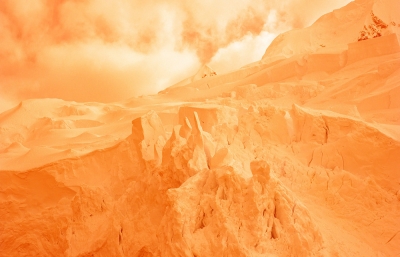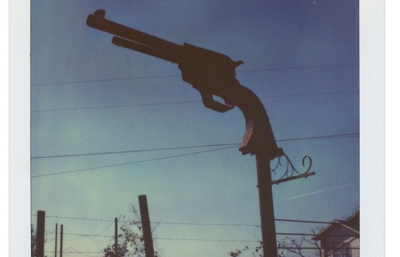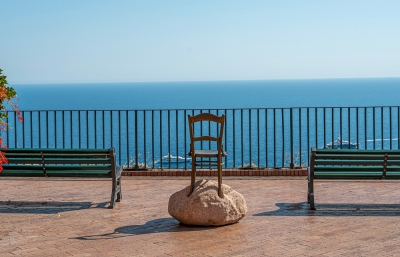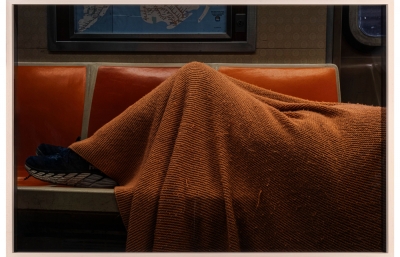
Vision Walk: los angeles
With giovanni reda
We arE traveling around the country with VANS VISION WALKS, a series of workshops led by some of our favorite photographers in their home cities. This past weekend we spent the AFTERNOON with giovanni reda as he led participants on a walk through the arts district in los angeles.
Raised in a blue-collar neighborhood of Brooklyn where most didn't get the chance or never chose to venture very far from, Giovanni Reda's interest in skateboarding and photography exposed him to a broader view of the world. "I think for me, that's what it was," he explains. "It made me more global, less local. People don't often get that opportunity." Reda photographed skateboarding during its heyday in NYC and his images capture iconic moments in '90s skate culture. After years of shooting for all the major skateboarding publications, he has begun to expand his creative output from still to filmmaking. And in 2016 a short VICE Sports documentary he made in which his friend, acclaimed pro skater Brian Anderson, comes out as gay, became a big turning point, opening his eyes to the power of documentary film.
Accompanying him on his Vans Vision Walk in Los Angeles, we chatted with Reda about skate photography, his progression from still to video, the similarities and differences between portraiture and documentary filmmaking, and how these pursuits have given him a more positive, broader understanding of people and the world.
Juxtapoz: How long have you been in LA?
Giovanni Reda: I think about 13 years.
But you spend most of your time in New York?
A lot of it. You can take the boy out of Brooklyn...
When did you first pick up a camera?
I got a camera for my birthday one year. I was like 20.
So it wasn’t until you were a little older.
Yeah, it was way later. That's the thing, I really didn't have too much interest in it. Then I got it and I was pretty hooked, because here we are!
And so you just started taking photos of skating because that’s what you were doing at that point?
That's all I was really interested in, all I wanted to shoot. I just didn't care about anything else. When I got a better camera setup I told myself I was just going to shoot something every day. I don't care what it is. A ledge trick, a slappy grind, three-stair ollie, whatever it is. I just made sure every time I went out skating I shot something.
Was it at that point that you began submitting work to magazines?
One thing leads to another and you meet this person and then that person. It's like anything else, you start at one place and then you just keep building.
When did you first become interested in the wider field of photography?
I met this fashion photographer in New York named Zach Gold, who became like a mentor to me. He had so much equipment and I was just tripping. Like, "Wait, you don't get kicked out of where you are shooting?" I'd see some his photos and ask, "How many lights are on this?" Then I started really getting into it and realizing that there's so much to photography, so many different ways to shoot and different styles. He opened my eyes to this whole other dimension of it.
"A camera is a really good icebreaker. It's a good way to talk to people and meet people and all you have to do is ask, "Hey, I want to shoot a portrait of you." It starts a conversation and It helps you open up to all types of things that maybe wouldn't have been there before."
I started really looking at books and different photographers. I got into Weegee, Avedon and Herb Ritts. I just couldn't look at enough photography. Even to this day, I still assist. Because I feel like I never did that when I was younger, when I definitely should have. So old dog, new tricks. I liked shooting portraits because you don't need too much to shoot a portrait. When shooting skateboarding, you've got to get the skater, you've got to get the spot, you've got to figure out a time, you've got to not get kicked out. Where as with a portrait it's like, “I'll meet you anywhere you want, and I can figure out some way to make something work.” I liked that but also, being a skateboarder in New York in the mid-'90s, we almost had this open-door policy to places. We'd roll up to Joe's Pub at two in the morning. There'd be a line around the corner and they'd say, "Oh yeah, come on in." We'd all just walk in with skateboards and camera bags. I started realizing that a camera is a really good icebreaker. It's a good way to talk to people and meet people and all you have to do is ask, "Hey, I want to shoot a portrait of you." It starts a conversation and It helps you open up to all types of things that maybe wouldn't have been there before. If you're just one track, like, "Nope, just doing this," there's all this stuff that you just miss out on.
There have been a lot of photographers that started out shooting skateboarding, but it also seems like it can sometimes be difficult to expand outside of that world.
You've got Atiba [Jefferson] who shoots a lot of basketball. He shoots a lot of stuff, which is amazing. He's an amazing photographer, and again somebody I look up to. I feel like, as skateboarders, we've done so much with so little that it's easy for us to kind of branch out. I think shooting skateboarding is one of the hardest things in the world to do. If you don't skate, you're not going to be able to shoot good skateboarding. It's just how it goes. I think that gives you an edge to get out, but there's also that thing of you're a big fish in a small pond and when you branch out into other aspects of photography, it doesn't matter how big of a fish you are, you're still in the fucking ocean.
Yeah, I could see that.
It can be a little scary. t's easy to be a skate photographer and call any skater and say, "Let's go shoot a photo." Because they'll say, "Sure." But when you're trying to get all this other work and you're branching out to all these other places, it can be a little bit daunting at times. But essentially it’s the same as shooting skateboarding, you shoot every day, build and build and build.
Do you still try to shoot every day?
I try to shoot as much as I can. Not every day. Skateboarding is also a young man's game, and I feel like I was able to shoot some really great people at a great time and I got great stuff. I’ve watched skater’s careers from when they're kids to when they grow up. I still go out and do it. I love shooting skating but I want to see what everybody else does now. I don't shoot as much, but I try to shoot a lot. I try to bring my camera around. I try to shoot a portrait here and there. I'm guilty of shooting on my iPhone like everybody else is. It's about shooting, right?
When you shoot portraits do you give a lot of direction?
Sometimes when I shoot portraits, I give a little bit of direction. But less is more sometimes. it depends on what you're trying to do..
It depends on the person?
When you're shooting a skate photo I think a tenth of it is the actual shooting the photo. There's so much that's going into the photo beforehand. You call the skater, think of a spot, meet up, grab a coffee, you go to some warmup spot, you skate around a little bit, you get back in the car, you drive or skate to whatever spot. Then you get there and then they're warming up there and they're getting psyched to try something. There's so much conversation and talk that's going in beforehand. You've got some skater that's like, "All right, I'm about to potentially really hurt myself right now for this person but I trust them." I feel like you get this deeper relationship and bond so when you're there shooting the photo, there's trust and the skater is not worried about what the photo's going to look like but about landing it.
It's the same thing with a portrait. You can sit there and have conversations with people and get to know them. By the time you stand up and say, "Okay, here's your mark. Stand there and I'm going to shoot a photo of you," I feel like all of that direction, it's already there. It's like, I know you. You know me. We already know each other. So no, I don't give too much direction unless it's some sort of ad thing.
Did you shoot much candid stuff during all those years?
I did, I was talking about this yesterday. A little point and shoot stuff, but again, when I was younger in New York shooting skating, I wanted to shoot more of that stuff, but then like Ari Marcopoulos was there. He was doing that, so thought, I don't want to do what Ari does. But when I look back at it now, he wasn't doing something that somebody else wasn't already doing. It was just the people he shot at the time. And I love Ari's photos, I think he's great. I just think I left a lot of gold out there. I left a lot on the table that I regret it today. Because sometimes it's not about how beautifully something is composed. When you're talking about candid stuff, it's that guy was with that guy at that place at that time.
You talk a little bit about this yesterday too, how you shouldn’t feel like you can’t have strong influences.
Yeah, you've got to put a little bit of your own self in there. Your own self might be the reactions on the people you're shooting, something you said or you did made them be that person or that way, the way they are at the moment. But even today when I look back at some of the candid stuff I do have, I think, "Ah, fuck, I wish I shot more of that stuff."
When you first start shooting, you don't often think about your photos in terms of time and how the work is going to look like in 20 years.
Never. I never even wrote dates on a lot of my images. You get caught up on the wrong shit. I try to keep better records now. I try to think a little more when I'm shooting. I I'm pretty sure I'll look back on this and I'll be like, "God, I sound like such a dick." Everything's a learning curve, right? Art's never finished. Isn't there some saying like that?
I thought it's something about knowing when you're finished.
Is it? I don't know, see what I'm saying? I feel like every artist probably looks back at their photos or their work and thinks, "I could have done that so much better. I could have done this. I could have done that."
Well that’s part of growing as an artist isn’t it?
I just remember looking at an old skate photo and wondering, "Why did I think this was good? This photo sucked." It's stupid but you know...
How has photography has affected your growth as a person outside of the art and the skating?
I grew up in a blue-collar Brooklyn neighborhood. No one's an artist there. My parents were like, "You've got to take the fire test," and I’m like, "I'm not running into no burning building." I wanted to go skate. I wanted to go to the city. I wanted to go hang out. So I think that being a photographer and having a camera opened me up to a broader view of the world, where you don't think so locally. This girl I know, her sister married the dude that lived around the corner from them and they bought a house up the street from their mom. There's a whole world out there waiting to be discovered. I think for me, that's what it was. It made me more global, less local. People don't often get that opportunity.

I remember during the heyday of shooting skating I would think, “Japan again? Could I not do this Japan trip?” In hindsight people sometimes work their whole life to go on vacation once. They go somewhere once! I feel like that aspect of it was priceless.
You've been doing more directing and filmmaking. When did you start doing that?
I used to have a show on The Berrics which got popular and then I hit Spike [Jonze] up and Vice would give me a little bit of dough to talk to different people, alternative athletes and stuff. The first four of them I was trying to find my voice still. I did one with Daewon [Song] where it started getting a little bit deeper. He started talking about his family and his son. Then I saw Brian Anderson and I told him I was doing this shoot with Vice asked if he would come out on my show, do a little interview. It's me. You know me. Tell some jokes. And then he was like, "Yeah, you know what? I think it's about time." Then one of the first things we filmed him saying is, "My name's Brian Anderson. I'm a pro skater. I'm here to talk about the fact that I'm gay." I was just kind of tripped, because all that schticky shit that I was doing, fuck all that. That had its time and its place. This is...
Something more.
There's something so big here, so amazing, so deep. That, for me, was a really big shift, because I feel like going from still to visual is a natural progression as a photographer. And then being able to get somebody like Brian to talk about that on camera with me... he could have done that with anybody, people that are far more talented than me. I knew, “there's something here, I’m liking this.”
Do you think the desire to reveal something about a person in a photograph translates to wanting to reveal something about somebody in an interview or on film? Is there a connection there between shooting portraits and your interest in film?
Yeah, I think so. Even doing all that Berrics stuff for all those years, where I got a camera and I a bunch of skaters. You've got to pull it out of them, you've got to pull it out of people. Then that little Daewon moment put that idea in my head. And when I talked to Brian and he was said, "Yeah, let's do this," I was like, "Holy shit." I didn't plan on that. I didn't say, "I want to make films. I want to make documentaries." It was just a fucking Eureka moment.

With skate photos, you're trying to capture a moment but tell the story as well. You want to have the beginning, the runway, the middle, the trick and the landing. Do you think that that's directed your photography outside of skateboarding as well?
That's a good question. I guess it depends on what it is. I guess with a portrait, you're just telling a piece of the story.
Skate photography is such an anomaly, you have to make sure you have everything in that image.
I think the thing is, when shooting skateboarding, you're always shooting something that somebody didn't do. This guy did this trick at this spot. Nobody did this trick at this spot. Yeah, there's the technical aspects of it, and if you watch any skate photographer shooting a skate photo, it's going to be a similar setup. Not all exactly the same, but I'm pretty positive that if you got ten different skate photographers shooting one skater doing the same trick on a handrail or something like that, you're going to have similar photo. My whole point is I think when you're thinking of getting that story with a portrait, I think the story is you're trying to shoot something of somebody that's not been seen before.
I was talking the other day, I shot Nas but I got the typical Nas photo which is a little bit of a bum-out. You're trying to get them to do something that no one's seen before. Like Avedon's photo of Charlie Chaplin doing the devil horns with the smile. They were trying to kick him out of the country but he called Avedon and wanted him to take his portrait. He was pretty much hiding out in Avedon's studio. It's a really famous photo. When you're getting something from somebody that's not what they normally do and they're out of their comfort zone, that makes it unique.
How do you juggle getting somebody out of their comfort zone without making them feel uncomfortable?
That's the age-old question, right? If I had that fucking answer, I would be shooting everybody and everything under the sun, and everybody would be calling me to shoot whoever for whatever. Sometimes some people loosen up. Some people are up for it. Some people aren't. Some people like to experiment. Some people want to give you a gift of something. Again, I always go back to Avedon because, I mean, how do you not? He said Charlie Chaplin gave him this gift. If somebody wants to do all that shit, just let them do it. If you can get them comfortable enough to do it, that's great. Sometimes you get it, sometimes you don't. Me asking Brian, "Hey, you want to come out to me on what I'm doing?" If I would have talked to him maybe ten minutes earlier or later, it could have been a completely different conversation. You never know. I just think you've got to keep trying to put out the best stuff you can and keep trying to make a difference with your work and keep pushing on your work. Try stuff, because you never know. Turn sideways. Maybe someone will do something goofy. Who knows?
With other art, such as painting, it's often a solo act, but you're shooting photos of people from skaters to portraits to interviewing people for a documentary, you're working with someone else, always.
Yeah, always. I like that, I like people. I like hanging out with people. I like talking to people. The more people you know, the more you get out there, the more you talk to people, the more uncomfortable positions you put yourself in, the more comfortable you get in any situation. It's being able to work with other people. Especially shooting photos or making documentaries or interviewing people. The more people you talk to, the more it just opens you. The more ideas you're open to, the more you'll be open for. It's a two-way thing. If you're going to be angry at everything and everybody, ain't nothing good going to come your way. If you're going to be trying to put good shit out there and positive shit out there, positive shit comes to you.
See, that's what happens when you go from some blue-collar Brooklyn neighborhood to going to shoot photos in the fucking city, you're talking about positive energy! But it's the truth.







